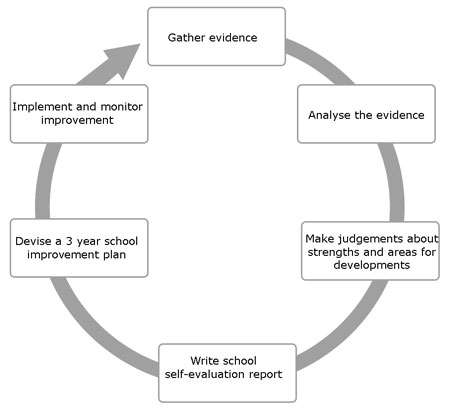1 What a school self-review is, and its advantages and challenges
What do we mean by school self-review? Quite simply, school self-review is about looking at how well a school is doing.
- How well are students learning?
- How well are they performing academically, socially, emotionally and physically?
- How well is the school organised to support students to learn?
- How effective are teachers in their core work of supporting students to learn?
- How well is the timetable organised?
- What role is played by co-curricular activity?
- How effective are relationships with the community?
Many more detailed questions can be asked and form the basis for self-review.
Pause for thought
|
Figure 1 Students learning.
In a self-review, the school leader and the teachers ask themselves the same sorts of questions that an external reviewer would ask. When they discover something that is not as good as they would like it to be (such as attendance being worse this year than last year), they can investigate and do something about it. Doing a ‘self-review’ is about finding out what the school does well and what needs developing before a formal external review takes place.
Understanding how well the school is performing can be time-consuming, but it is a critical element in school leadership. A shopkeeper needs to know what has been sold every day so that they can order the correct amount of stock for the next day. She needs to know what has not been selling well and try to ensure that her staff are working well and honestly, and that there is enough profit to pay them and buy new stock. A shop cannot afford to be inefficient or it will lose money and go out of business. Schools do not have simple profit and loss accounts, but they still need to know if they are doing well.
Case Study 1: Mr Mohanty builds bridges with parents
Mr Mohanty is a newly appointed school leader at a medium-sized rural secondary school with nine teachers.
I was nervous about starting my new job. The school had a poor reputation, as a previous head had misappropriated school funds. My immediate predecessor had only been in the job for a few months and found the distrust in the community difficult to handle. I decided that I needed to do two things: the first was to listen carefully and gather as much information as I could about the school, and the second was to give the teachers some positive feedback as soon as I could. Morale was clearly very low, with teachers leaving at the earliest opportunity every day.
I started by looking at the attendance data and the exam results. Neither were very good, but the maths results were better than the rest, so I spoke to the two maths teachers, congratulated them and asked them about their approach to teaching. I also looked at information about the number of courses that teachers had attended, the records from parents’ evenings (very few parents attended), the punishment book (there were a lot of entries) and the minutes of the school management committee [SMC] meetings.
After a few weeks I had a clear idea about how well the school was performing, the extent of stakeholder involvement, and some evidence about the better aspects of the school. The data I collected provided a basis for my own evaluation, and for discussion and planning. It also gave me some bench marks against which I could measure progress.
Activity 1: Identifying the advantages of self-review
School self-review consists of collecting data, and then analysing that data to work out what the school is doing well and what needs to improve. The self-review will form the basis of a school development plan, which you study further in another School Leadership unit (Perspective on leadership: leading the school development plan).
Re-read the case study and in your Learning Diary, make a list of the advantages of the process of self-review.
Discussion
School self-review has to be an objective process. It must be fair and measured, using evidence based on observations and data. It is not about simply collecting information to satisfy legal requirements or to respond to external demands; nor is it about listening to or acting on prejudices, or favouring some stakeholders over others.
Activity 2: True or false?
For each of the following statements, reflect on the extent to which they are true. Are the statements ‘always true’, ‘sometimes true’ or ‘never true’? Note down your thoughts in your Learning Diary.
- School self-review is only for school leaders and stakeholders.
- School self-review tells you everything you need to know about a school.
- School self-review is best carried out in a culture of honesty.
- School self-review is about finding out what is wrong with the school.
- School self-review takes a great deal of time.
- School self-review can help everyone see what needs doing.
- School self-review provides a basis for analysis reflection and planning.
Discussion
Of the above, only statements 3, 6 and 7 are always true. Although a school self-review is led by school leaders, the process can involve anyone. In some schools, students are key players in review – after all, they see more of teaching and school organisation first-hand than anyone else and, when suitably prepared, can play a valuable role.
The review will focus on certain key areas. An annual review may focus on several key areas, or one or two really important ones. The purpose is not to find out about what is wrong, but to enable school leaders to celebrate the schools’ successes and identify areas for development. It is important that it is not conducted in an atmosphere of attributing blame.
Done properly, a school review is part of the daily work of the school leaders. Much of the data will be collected routinely. The analysis is both interesting and informative, and enables them to focus their energy on the areas that will make the greatest difference. It takes time, but it will ultimately make the school leader’s job easier.
Activity 3: Identifying the challenges and opportunities
Consider the following two scenarios and note down your responses to the questions in your Learning Diary.
- Imagine you have just taken over as the leader of a newly established school that has only been open for a year. You will need to find out about your new school before you can make a plan about how to make improvements. What challenges do you think you will face and what opportunities does a review present?
- Imagine you have been the school leader for ten years in the same school. The District Education Officer has called a meeting of all the local school leaders to explain that they want you to carry out a review of your school and report back in six months’ time, along with an action plan. What challenges do you think you will face and what opportunities does the review present?
Discussion
As a new school leader, teachers will be anxious to impress you, so collecting accurate data might be difficult. Some teachers might be suspicious of your motives; some will be worried that you are going to blame them for things that are wrong with the school. It will be important to make sure that you start by focusing on something that you think the school does well.
As an established school leader, any new behaviour on your part might be treated suspiciously. You will need to emphasise that this will be a team effort and that you need their help. Make sure that you start by collecting data on something that is going well. The public celebration of success will give people confidence and make it easier for you to tackle issues that are problematic.
The process of self-review needs to be managed well, so that stakeholders are clear about the process and the purpose. They are then more likely to contribute to the process in a considered and constructive way. The process needs to be positive and open – it is not about finding out what is wrong and attaching blame. The process should also be realistic and focused in terms of what is reviewed and how much time is spent gathering information that will make a difference to outcomes for students.
Self-review is part of a cycle of improvement activity that is summarised in Figure 2. You will see that there are different stages that all feed into a cycle of review and change. There are other leadership units that address planning and implementing change which may be useful for you to look at next.
Figure 2 The self-review cycle (adapted from Professional Development Service for Teachers, undated).
The rest of this unit will focus on how to gather evidence, how to organise it and how to present it on a self-review form.
What school leaders will learn in this unit


